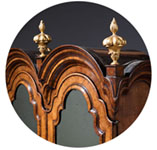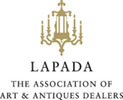A William and Mary Olive Oyster 31” Table
Circa 1670-1690
Sold
Follow Us
A William and Mary Olive Oyster 31” Table, Circa 1670-1690.
Inlaid with holly the moulded and banded top sits above a frieze drawer, beautifully raised on original freely carved Solomonic or twist legs, terminate on reverse pears and joined by ‘y’ shaped stretcher veneered in cross-grain olive, on all four original bun feet.
It is most likely that this gorgeous piece was commissioned during the short reign of William and Mary (1689-1702). This was a great time in British furniture design with some of the most notable pieces to date being commissioned. However, all the credit cannot simply go to the indigenous as a large influx of skilled craftsman flooded in from the continent such as, Daniel Marrot (1661-1752) a French Protestant architect, furniture designer and engraver who was at the forefront of late baroque style.
It should be noted that tables such as this are extremely rare and even more so in this condition, with all four original bun feet.
Condition
Superb original condition, including bun feet
Provenance
Private London Collection
Literature
Dimensions
PREVIOUSLY SOLD FURNITURE
No Results Found
The page you requested could not be found. Try refining your search, or use the navigation above to locate the post.
No Results Found
The page you requested could not be found. Try refining your search, or use the navigation above to locate the post.
YOU MAY ALSO LIKE
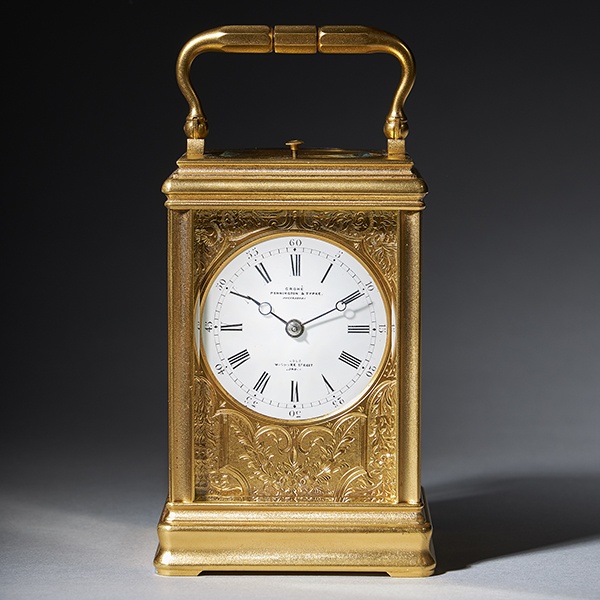
19th Century Repeating Gilt-Brass Carriage Clock by the Famous Drocourt
19th Century Repeating Gilt-Brass Carriage Clock by the Famous Drocourt £5,600 Follow Us19th Century Repeating Gilt-Brass Carriage Clock by the Famous Drocourt A superb repeating carriage clock with a gilt-brass gorge case by the famous maker...
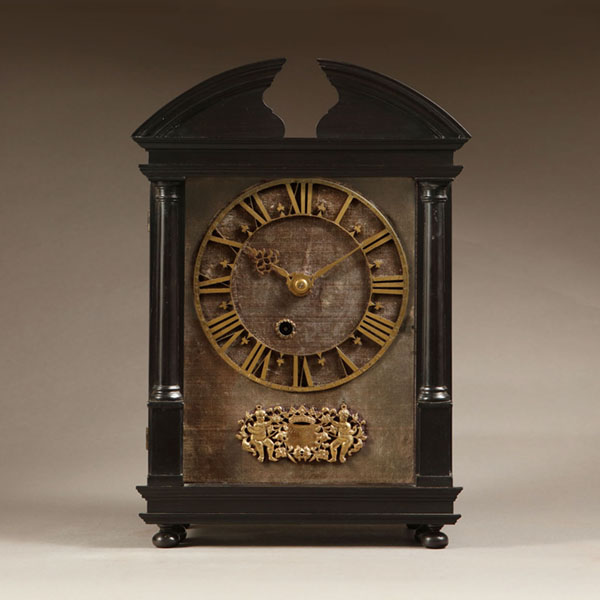
17th-Century Hague Clock Signed by Pieter Visbagh, circa 1675
Small 17th Century Hague clock made c. 1675 by Pieter Visbagh, who was apprenticed by Salomon Coster. The latter made the first pendulum clock according to the instructions of Christiaan Huygens, the internationally renowned scientist who developed the idea of applying a pendulum to a clock movement.
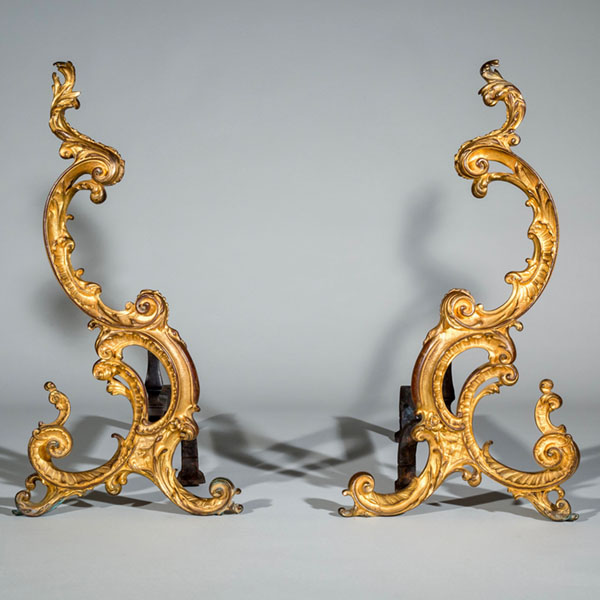
Pair of 18th-Century English Rococo Gilt Bronze Andirons or Firedogs
An exceptional pair of 18th century English Rococo gilt bronze andirons or fire dogs.
The bold shape of these andirons relate to designs of Thomas Johnson (1714–1778), one of London’s pioneers of the ‘Modern’ or French style, later known as Rococo.
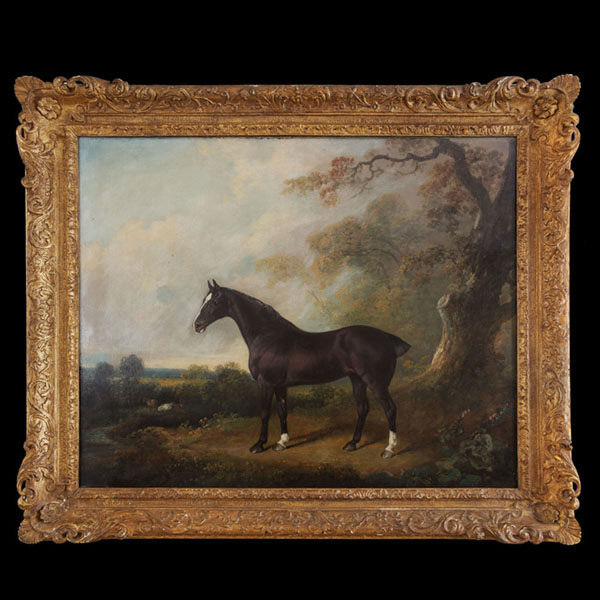
Oil Painting of a Horse Standing Proud in Woodland
Fine Art – Charles Henry Scwanfelder (1774-1837). Signed C H Schwanfelder Pinx and dated 1825. An exceptional portrait of a horse standing proud in woodland, in front of a tree-lined vista incorporating cows residing by a stream.
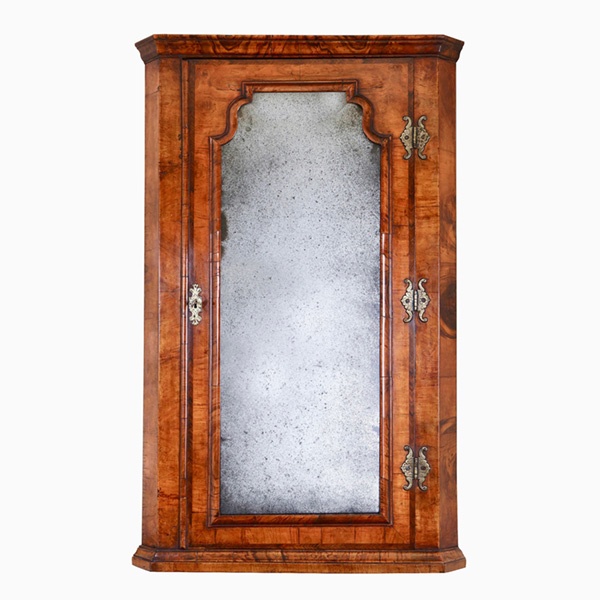
Queen Anne Walnut Corner Cupboard with Bevelled Mirror Plate
A truly remarkable find in original condition. To the door a shaped soft bevelled mirror plate is framed by a cross-grain molding of typical queen Anne design which is further cross-banded, feather-banded and edged to the opening with a single de-molding.

19th Century Repeating Gilt-Brass Carriage Clock by the Famous Drocourt
19th Century Repeating Gilt-Brass Carriage Clock by the Famous Drocourt £5,600 Follow Us19th Century Repeating Gilt-Brass Carriage Clock by the Famous Drocourt A superb repeating carriage clock with a gilt-brass gorge case by the famous maker...

17th-Century Hague Clock Signed by Pieter Visbagh, circa 1675
Small 17th Century Hague clock made c. 1675 by Pieter Visbagh, who was apprenticed by Salomon Coster. The latter made the first pendulum clock according to the instructions of Christiaan Huygens, the internationally renowned scientist who developed the idea of applying a pendulum to a clock movement.

Pair of 18th-Century English Rococo Gilt Bronze Andirons or Firedogs
An exceptional pair of 18th century English Rococo gilt bronze andirons or fire dogs.
The bold shape of these andirons relate to designs of Thomas Johnson (1714–1778), one of London’s pioneers of the ‘Modern’ or French style, later known as Rococo.

Oil Painting of a Horse Standing Proud in Woodland
Fine Art – Charles Henry Scwanfelder (1774-1837). Signed C H Schwanfelder Pinx and dated 1825. An exceptional portrait of a horse standing proud in woodland, in front of a tree-lined vista incorporating cows residing by a stream.

Queen Anne Walnut Corner Cupboard with Bevelled Mirror Plate
A truly remarkable find in original condition. To the door a shaped soft bevelled mirror plate is framed by a cross-grain molding of typical queen Anne design which is further cross-banded, feather-banded and edged to the opening with a single de-molding.
